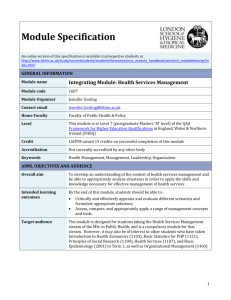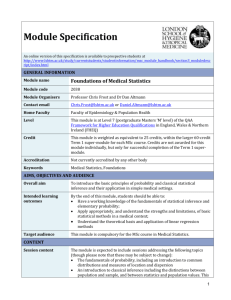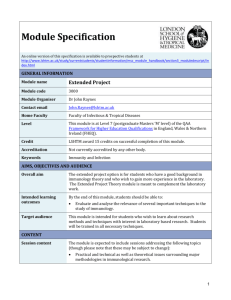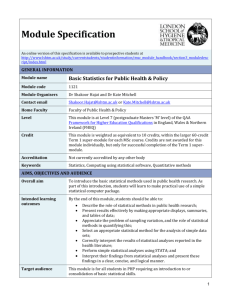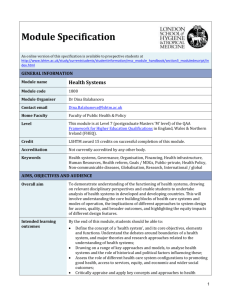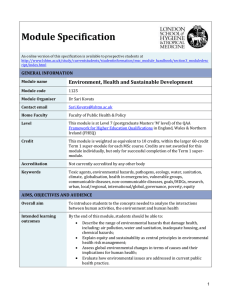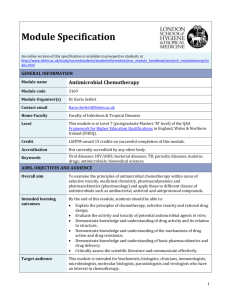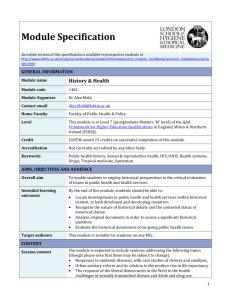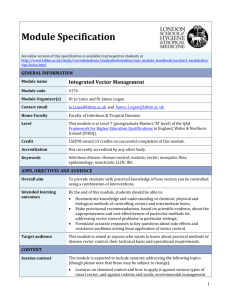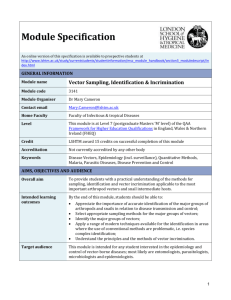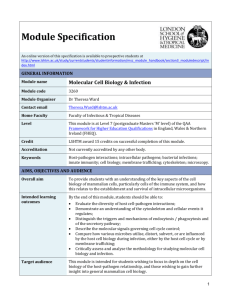1300 Environmental Health Policy Module Specification
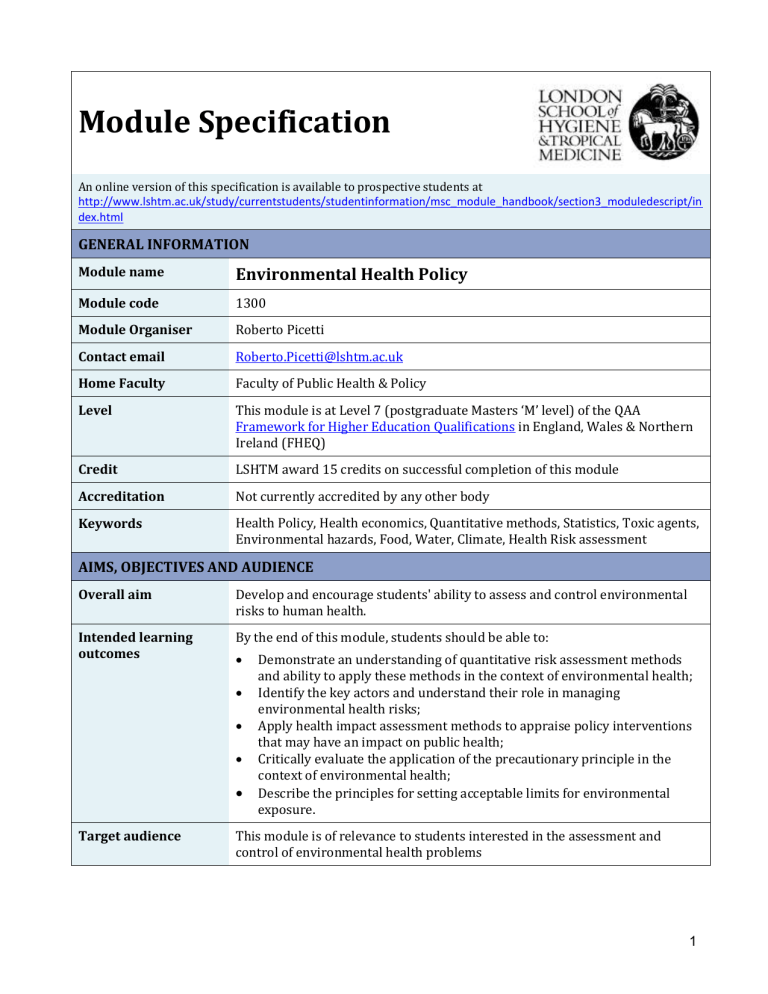
Module Specification
An online version of this specification is available to prospective students at http://www.lshtm.ac.uk/study/currentstudents/studentinformation/msc_module_handbook/section3_moduledescript/in dex.html
GENERAL INFORMATION
Module name
Module code
Module Organiser
Environmental Health Policy
1300
Roberto Picetti
Contact email
Home Faculty
Level
Roberto.Picetti@lshtm.ac.uk
Faculty of Public Health & Policy
This module is at Level 7 (postgraduate Masters ‘M’ level) of the QAA
Framework for Higher Education Qualifications in England, Wales & Northern
Ireland (FHEQ)
Credit
Accreditation
Keywords
AIMS, OBJECTIVES AND AUDIENCE
Overall aim Develop and encourage students' ability to assess and control environmental risks to human health.
Intended learning outcomes
LSHTM award 15 credits on successful completion of this module
Not currently accredited by any other body
Health Policy, Health economics, Quantitative methods, Statistics, Toxic agents,
Environmental hazards, Food, Water, Climate, Health Risk assessment
Target audience
By the end of this module, students should be able to:
Demonstrate an understanding of quantitative risk assessment methods and ability to apply these methods in the context of environmental health;
Identify the key actors and understand their role in managing environmental health risks;
Apply health impact assessment methods to appraise policy interventions that may have an impact on public health;
Critically evaluate the application of the precautionary principle in the context of environmental health;
Describe the principles for setting acceptable limits for environmental exposure.
This module is of relevance to students interested in the assessment and control of environmental health problems
1
CONTENT
Session content The module is expected to include sessions addressing the following topics
(though please note that these may be subject to change):
Risk assessment as a structured method to estimate quantitative health impacts
Risk management as a framework for assessing and controlling environmental hazards
Roles of scientific, socio-cultural, historical, economic and political factors in influencing the management of environmental risk.
Environmental health policy scenarios, such as global climate change, road transport, occupational and water-related health risks.
TEACHING, LEARNING AND ASSESSMENT
Study resources provided or required
Teaching and learning methods
Assessment details
Assessment dates
Language of study and assessment
Readers and directed readings provided to students. “Environmental Health
Policy” by David Ball (Open University Press) is useful to have as a reference, but not required.
A variety of methods will be used, including lectures, seminars and directed reading. One session will consist of student led seminars on environmental health policy topics to be assigned in the course.
Assessment will be based on a report.
Students will select a specific policy scenario from a suggested list. First, they will work with group under the same topic to address guided elements of report, followed by group presentation to share their findings in the class. Then students will develop a policy report on the same topic individually (2000-
2500 words excluding references) to submit at the end of this module.
For students who are required to re-sit, or granted a deferral or new attempt, the task will be the same as the original assessment (only a report without group work) but with a different topic.
Group presentation will take place in the 3 rd or 4 th week of this module and submission of individual essay will be on Friday 20 May 2015.
For students who are required to re-sit, or granted a deferral or new attempt, the next assessment deadline will be the standard School-recommended date in mid/late September 2016
English (please see ‘English language requirements’ below regarding the standard required for entry).
TIMING AND MODE OF STUDY
Duration
Dates
The module runs for 5 weeks at 2.5 days per week; this module runs between
Wednesday lunchtime and Friday afternoon.
For 2015-16, the module will start on Wednesday 20 April 2016 and finish on
Friday 20 May 2016.
Timetable slot The module runs in LSHTM timetable slot E
2
Mode of Study The module is taught face-to-face in London. Both full-time and part-time students follow the same schedule. . For full-time students, other LSHTM modules are available in the other half of the week for the C and D slots.
Learning time
APPLICATION, ADMISSION AND FEES
Pre-requisites It is helpful but not essential to have taken the module: Environment, Health &
Sustainable Development (1125). This module is complementary in content to the module: Environmental Epidemiology (1301).
English language requirements
The notional learning time for the module totals 150 hours, consisting of:
Contact time ≈ 35 hours
Directed self-study ≈ 36 hours
Self-directed learning ≈ 29 hours
Assessment, review and revision ≈ 50 hours
Student numbers
Student selection
Fees
A strong command of the English language is necessary to benefit from studying the module. Applicants whose first language is not English or whose prior university studies have not been conducted wholly in English must fulfil
LSHTM’s English language requirements , with an acceptable score in an approved test taken in the two years prior to entry. Applicants may be asked to take a test even if the standard conditions have been met.
Student numbers are typically 15-20 per year; numbers may be capped due to limitations in facilities or staffing.
Preference will be given to LSHTM MSc students registered for Public Health courses and taking the Environment & Health stream and LSHTM research degree students. Other applicants meeting the entry criteria will usually be offered a place in the order applications are received, until any cap on numbers is reached. Applicants may be placed on a waiting list and given priority the next time the module is run.
Partial Registration (partial participation) by LSHTM research degree students is allowed for this module.
For registered LSHTM MSc students, fees for the module are included within
MSc fees (given on individual course prospectus pages ).
If registering specifically for this module, as a stand-alone short course , individual module fees will apply.
Tuition fees must be paid in full before commencing the module, or by any fee deadline set by the Registry.
Scholarships Scholarships are not available for individual modules. Some potential sources of funding are detailed on the LSHTM website.
3
Admission deadlines For 2015-16:
For registered LSHTM MSc students, the module choice deadline (for Term
2 and 3 modules) is Friday 20 November 2015.
If registering specifically for this module, applications may be made at any time but, as places are limited, applications ahead of the MSc deadline are strongly advised. All applications should be submitted at the latest 8 weeks prior to the start of the module. Formal registration will take place on the morning of the first day of the module.
ABOUT THIS DOCUMENT
This module specification applies for the academic year 2015-16
Last revised 27 July 2015 by Roberto Picetti
London School of Hygiene & Tropical Medicine, Keppel St., London WC1E 7HT. www.lshtm.ac.uk
4
